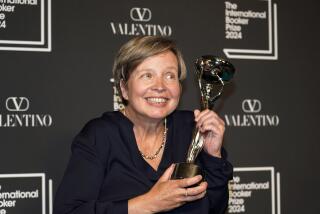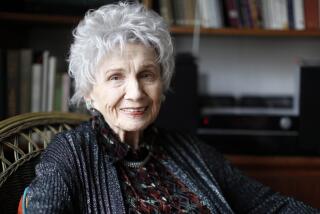Commentary: Why Bob Dylan’s Nobel Prize is the best thing that can happen to the book world

When the Nobel Prize was given to Bob Dylan this week, it seemed to many in the book world like a lost opportunity.
Each year, the bright light of the Nobel falls across our cultural canvas and illuminates the work of a major writer — and in recent years that’s usually been a writer who is little-known to American audiences.
If that meant the Nobel had been feeling increasingly remote, it was expanding our conversation. Sure, we might be raising an eyebrow and asking one another who the heck Tomas Transtromer or Svetlana Alexievich might be, but this was good – it asked us to consider the written words of the wider world.
Americans notoriously read very little work in translation; it’s only about 3% of our annual book-buying diet. A Nobel raises the profile of its author considerably.
Before their prizes, recent Nobel winners have mostly been published by small, independent presses here in the U.S. (afterward, they are picked up by major publishers). When the prize is announced, there’s a rush on their work, which means an influx of cash to a struggling small press and runs to the independent bookstores that regularly carry those books.
So there were murmurings of dismay in the publishing community when the Nobel Prize in literature went to a Grammy-winning musician who’s been making headlines for more than five decades. There would be no fall Nobel bump.
But it’s not the job of the Swedish Academy to bolster American independent publishing. Really, its task is to award excellence in literature.
By picking Dylan, it made a bold gesture to expand the definition of “literature.” It has, in effect, thrown open the doors to popular culture.
And that is a huge opportunity.
The divisions between “high culture” and “low culture” are as archaic as the gramophone and 5-cent silent movies. We live in a world where people read books and comic books, watch films and television shows, listen to podcasts and pop music, with equal avidity and intelligence. And the Nobel, in recognizing Dylan’s work as literature, acknowledges that artists create works of popular culture with just as much care, control, courage and genius as Ernest Hemingway did sitting down at a typewriter.
Dylan experts can battle over whether or not he writes poetry; he wasn’t given the prize for that. He was given the prize for writing lyrics and music.
If music and lyrics can count as literature, as plays have done, could not other forms?
Could we, someday, see a Nobel in literature go to Art Spiegelman, Barbara Kopple, Alejandro Jodorowsky, David Simon, Ira Glass, Hayao Miyazaki, Beyoncé?
Wait, wait, hear me out. We are experiencing an undeniable renaissance in storytelling in traditional media like television and film, not to mention new Web series, podcasting and emerging forms like the visual album.
Although it could be argued that authorship is complicated when considering collaborative works like film, television and music, the Swedish Academy swept that aside by giving the prize to Dylan. No matter how many names you can find on his records, the Nobel went to him alone.
When I talked to former L.A. Times pop music critic Robert Hilburn about Dylan’s work, he emphasized the words. “He’s a great cultural figure because of his words and his ideas,” he said.
And for all the flash and bang of any performed art or filmed project, it’s the words that count. “Breaking Bad” didn’t exist without Bryan Cranston’s brilliant performance — but he couldn’t get there without the words on the page.
Dylan’s Nobel says that words don’t have to be bound within covers to be literature. It’s possible the Swedish Academy will back off its radical choice. Who knows what kind of pressure it will be under to return to the traditional choice, to return to the poets and playwrights and novelists who have traditional publishers, traditional books.
But for now, literature is all around us. Read it or listen to it or watch it.
Dylan’s Nobel Prize is a wonderful moment — a wonderful moment for literature.
ALSO:
Critics wonder if Bob Dylan really needs a Nobel Prize
Bob Dylan, interpreter: Seven of the artist’s greatest covers
Celebrating Dylan’s late career work, when he started getting obsessed with death
More to Read
Sign up for our Book Club newsletter
Get the latest news, events and more from the Los Angeles Times Book Club, and help us get L.A. reading and talking.
You may occasionally receive promotional content from the Los Angeles Times.










